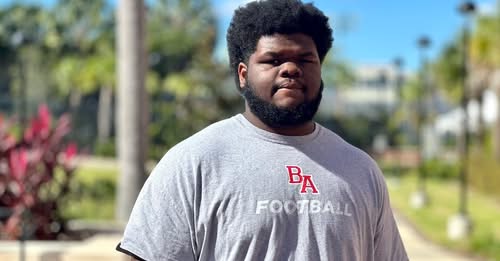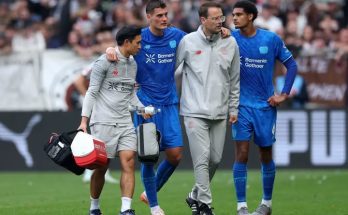Stephon Shivers, a towering defensive lineman standing at 6-foot-4 and weighing in at around 399 pounds, had appeared poised to make an immediate splash at the University of Florida. A three-star recruit ranked No. 51 nationally among his position, he initially committed to Georgia in 2024 before flipping to Florida in November of that year—a move that sparked excitement, given his rare athleticism for someone of his size . Shivers enrolled early in Gainesville in January 2025 and participated in spring practices, where coaches praised his potential as a nose tackle. They highlighted his unusual combination of size, strength, quickness and footwork. One coach even marveled at how a 380-pound player could break off a 75-yard touchdown run in high school, clearly seeing remarkable upside .
That narrative took a dramatic turn in early June. On the first day of that month, Gainesville police arrested the 17-year-old Shivers on a charge of third‑degree felony false imprisonment, specifically tagged as an incident of dating violence. According to the police report, the episode unfolded when a dispute—over what Shivers allegedly discovered on the young woman’s cellphone—escalated into physical abuse. The victim told authorities that Shivers blocked her exit, choked her “to the point she couldn’t breathe,” and punched her multiple times in the face after pushing her onto a bed. He also allegedly threw her phone against a wall and damaged her apartment in the process . Fresh wounds were noted on the victim’s face, and dents matching the shape of a phone appeared in the wall .
Following his arrest on June 1, Shivers was formally charged with false imprisonment. Under Florida law, this offense carries a maximum penalty of up to five years in prison and a possible fine of $5,000 . At his first court appearance in Alachua County Juvenile Court on June 4, Judge Susanne Wilson Bullard placed him under house arrest. Conditions permitted him to continue attending school and football practices but enforced a strict no-contact order with the alleged victim .
Florida’s athletic department and coaching staff expressed that they were closely monitoring the situation and would await the outcome of law enforcement’s investigation. Meanwhile, Shivers remained on house arrest but somewhat integrated with team routines for academic and practice commitments .
Just days later—on June 16—the university formally announced that Shivers had been dismissed from the football program. His name was promptly removed from the 2025 Gators roster . Head coach Billy Napier and athletic officials reportedly decided the dismissal was necessary because the alleged severity of the offenses conflicted with the program’s standards and image .
Early commentary on forums like Reddit’s r/CFB reflected the intensity of public reaction. Many users believed that a felony domestic abuse allegation—especially one reportedly ongoing for more than three years—would almost certainly eliminate his prospects for joining any major college program moving forward. One redditor wrote, in part:
“Hopefully none, seeing as the complaint is domestic abuse that happened for more than three years.”
Another added:
“3 years of domestic abuse is tough even for the most desperate of schools. I’m gonna bet Juco.”
These sentiments underscore how serious and potentially career‑ending such accusations can be, even for high‑ceiling athletes.
Shivers’s dismissal also raises larger questions about the intersection of athletic talent, accountability and the responsibilities of collegiate programs. In an era where public trust in athletic institutions is shifting, universities are increasingly pressured to take immediate, decisive action when serious misconduct is alleged. Florida’s prompt decision to dismiss Shivers reflects this broader trend. No longer can programs afford prolonged investigations at the expense of institutional integrity. Especially in high-visibility sports like football, swift disciplinary responses are demanded both from within and outside the institution.
For Shivers personally, the fallout is jarring. Just weeks ago, he was a freshman with a bright future—poised to push for early playing time and emboldened by coaches’ confidence in his raw potential. Now, having lost his place on one of the most prominent teams in college football, he faces serious legal consequences, steep personal upheaval, and an uncertain future athletically.
Florida’s actions, even with no conviction yet, reflect a calculated balance: safeguarding the program’s reputation, upholding institutional integrity, and sending a message about behavioral expectations. That balance mirrors policies at other major conferences—where allegations of domestic violence or dating abuse trigger automatic investigations and often immediate removal from athletic privileges or teams, pending resolution of legal proceedings.
As the legal process unfolds, Shivers remains under house arrest with conditions reflective of the charges. Prosecutors will build their case based on the alleged assault, choking, false imprisonment and property damage. The fact that law enforcement reported visible injuries, blocked exits, and testimony of prolonged abusive behavior may significantly bolster the prosecution’s position .
If convicted, Shivers could face up to five years in prison and a maximum $5,000 fine. He will also likely be burdened with a permanent criminal record—impacting future educational, athletic, and employment opportunities. Even if he avoids the full prison term, the blemish will remain, especially in an industry increasingly intolerant of abusive behavior.
From a football standpoint, Shivers’s dismissal leaves a void in the Gators’ defensive line depth chart. He was expected to provide size and interior disruption—a rare mix of athleticism and power. Replacing that kind of upside isn’t easy; Florida will have to rely on other recruits or potentially dip into the transfer portal to retool the position.
Meanwhile, Shivers’s case resonates beyond Florida. It sends a broader signal to the collegiate sports world: talent does not shield players from accountability. If you face serious legal allegations—especially those involving violence—no program, regardless of prestige or coach support, is willing to risk backlash by appearing to protect you. That precedent has implications for scouting, recruiting, and how universities weigh character alongside athletic ability.
Some may argue the dismissal timeline seemed abrupt, given that Shivers was legally permitted to continue attending classes and practices. Yet many see it as necessary. In an age defined by viral media, heightened awareness of gender violence issues and zero-tolerance policies, coaches and institutions feel compelled to act decisively. Even the appearance of inertia or complacency can provoke severe backlash—from sponsors, fans, media, campus communities, and advocacy groups.
In Florida’s case, the Gators made their position clear. The university took note of the allegations, respected legal due process, but responded quickly once the nature of the charges became indisputably serious. A program spokesperson stated that the team would follow law enforcement guidance and monitor the situation—but ultimately recognized that allowing Shivers to remain would be untenable.
That posture—of deferring to law enforcement but not waiting until conviction—reflects contemporary best practices among athletic directors and compliance officers. They understand that convictions can take months or years, but public scrutiny is immediate. Many universities now include stipulations in athlete codes of conduct that allow for interim suspension or dismissal when felony allegations surface. It’s a legal grey area but one increasingly defended by institutional precedent and public expectation.
Shivers’s journey—from elite recruit enrollee to dismissed athlete facing serious felony charges—serves as a case study in how quickly things can escalate. For him, the potential long-term impact includes not just legal consequences, but lost scholarships, damaged reputation, ruptured relationships, and a likely end to ambitions of playing at the highest level. It also underscores a sobering truth: No matter how talented or physically imposing, athletes are not exempt from accountability.
The outcome of Shivers’s case remains uncertain. He may plead guilty to a lesser charge, take part in diversion programs, or pursue rehabilitation. It’s possible he will rebuild his life—though likely not in the SEC spotlight. Players with similar fallouts sometimes find routes through junior colleges, non-scholarship blow-up programs, or overseas leagues. But in mainstream college football, this incident will shadow him indefinitely.
Beyond individual consequences, Florida’s swift action indicates a shift in collegiate sports culture. It signals that high-character ideals must match high-performance demands. The era of programs tolerating “locker room” behavior is fading fast. Coaches and ADs are under extraordinary pressure to enforce moral standards, even at the expense of on-field success.
As coaches start summer conditioning and recruiting ramps up, Florida’s staff must adjust. Defensive coordinator Matt House and the defensive line coach will need to reallocate reps among current players and consider bolstering the unit with incoming transfers or future classes. Recruiting in the trenches is always challenging; losing a physical specimen like Shivers leaves a gap—but also offers an opportunity for other young players to step up.
Meanwhile, the university may revisit its educational programs—reinforcing workshops on relationship violence, consent, behavioral conduct—and ensure every athlete understands expectations and consequences. There could also be internal reflection within the athletic department about how to better screen recruits for character risk and how to respond to incidents that emerge post-enrollment.
In many ways, the Stephon Shivers case captures the complexities facing college athletics today. It encompasses the collision of raw athletic potential, youthful immaturity, serious allegations of violence, institutional responsibility, public accountability, and long-term personal fallout. There are no easy answers—but one thing is clear: in today’s environment, talent alone is no longer enough to protect players who cross moral or legal lines.
For Shivers, the next chapter will play out far from the practice field: in courtrooms, counseling sessions, and perhaps on personal redemption pathways. Whether he re-emerges in football—or at all—depends on how the legal process unfolds, how he responds individually, and whether any program is willing to offer him a path forward.
For Florida, the incident is a test case in managing crisis, maintaining standards and protecting program integrity. Their dismissal of a teenage defensive lineman—albeit one with prodigious potential—reflects prioritization of values and accountability over athletic gain.
As the Gators gear up for the upcoming season, they will attempt to close the book on this episode. But the kind of cultural shift it represents—swift action, public responsibility, and moral clarity—will echo throughout college sports discussions in the months to come.
Ultimately, the story of Stephon Shivers is a reminder: athletic prowess may open doors, but respecting boundaries and basic decency keeps them open. When those boundaries are violated, even the most promising prospects can fall—and entire programs must decide if and when to swing the door shut.



